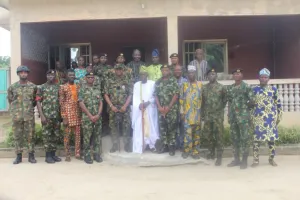Two new search and rescue sub-centres on the African coast have been established, extending and improving the coverage of existing Maritime Rescue Co-ordination Centres, in particular the centre in Mombassa.
The two additional sub-centres, which will operate in conjunction with the Mombassa MRCC, are at Dar es Salaam in Tanzania and at Victoria in the Seychelles. Both were commissioned recently by the Secretary-General of the International maritime Organisation (IMO), Mr. Efthimios Mitropoulos and the respective Transport Ministers of both countries.
The process of providing MRCC facilities along the African coast began at the October 2000 IMO Conference on Search & Rescue and the Global Maritime Distress and Safety System, held in Florence, Italy. At that meeting African governments agreed to a regional approach in the provision of Search and Rescue (SAR) services in western, eastern and southern parts of the continent. A resolution was adopted inviting the African countries bordering the Atlantic and Indian Oceans to establish five regional centers and 26 sub-centers to cover their entire coastline areas for SAR co-ordination purposes.
Africa had been identified as being one of the areas worst affected by a lack of adequate SAR and communications infrastructure and the establishment of appropriate SAR facilities on the African coast was seen as a key component in the establishment of the Global SAR Plan, which had been agreed in finality at an IMO Conference held in Fremantle, Australia in 1998.
Resulting from those resolutions, the commissioning of the first regional MRCC at Mombassa took place in May 2006 and was followed by Cape Town in January 2007 and Lagos, Nigeria in May 2008. The fourth MRCC, in Monrovia, Liberia is scheduled for commissioning in April this year.
IMO Secretary-General Mitropoulos said that this network of regional MRCCs and sub centers would make an important contribution towards the overall objective of safeguarding life at sea, as well as strengthening the capacity of the region to provide effective maritime security and environmental protection.
“I have been impressed by the determination of the two host Governments to play their part, responsibly and effectively, in the smooth and successful operation of the Global SAR plan; by the thorough and up-to-date equipment, both terrestrial and satellite, installed in the centers, for which I thank the donors; and, above all, by the commitment and dedication of the well trained personnel that man the centers on a 24-hour basis, 365 days a year,” he said.
“There is no doubt that, despite the continual advances made in ship technology and in the development of the human element at sea, seafaring remains a challenging and sometimes dangerous occupation. Accidents can, and do, occasionally happen and when they do, the sea can suddenly become a very lonely, isolated and, at times, deadly workplace. The establishment of a comprehensive and effective system for maritime search and rescue has, consequently, long been an important objective for the entire maritime community and, in particular, for IMO, as the United Nations agency with prime responsibility for the safety of life at sea,” he added.
















Discussion about this post